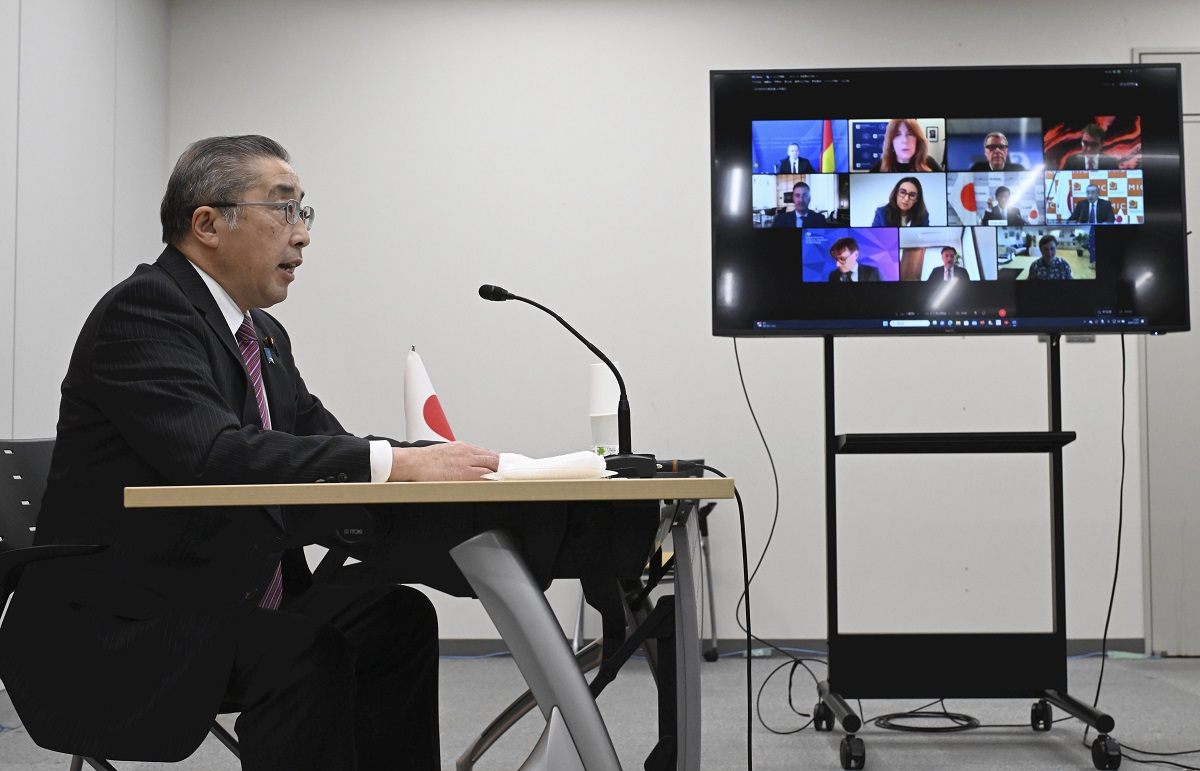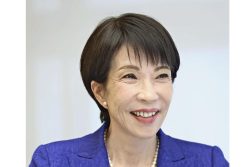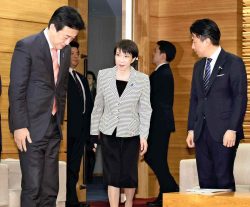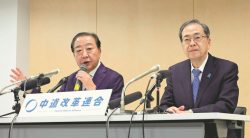
Internal Affairs and Communications Minister Junji Suzuki speaks at an online G7 ministerial meeting, in Tokyo on Friday.
17:01 JST, December 2, 2023
Group of Seven digital and technology ministers on Friday agreed international guidelines for artificial intelligence developers and users at an online meeting.
The gathering was held as part of the Hiroshima AI Process — a framework for G7 countries to discuss international regulations for generative AI, among other purposes.
The ministers issued a statement on the day detailing the guidelines and comprehensive measures to deal with false information, among other issues.
As Japan is this year’s G7 chair, the session was helmed by Internal Affairs and Communications Minister Junji Suzuki.
The ministers’ statement is the first international agreement to specify a wide range of measures against a background in which the use of generative AI is spreading rapidly. G7 nations are scheduled to reach a final agreement on the issue at an online meeting among their leaders to be held in early December, at the earliest.
G7 nations, which hold different positions on AI-related regulations, moved forward with the agreement based on a shared sense of urgency over the spread of false information that has the potential to shake the foundation of democracies.
In addition to guidelines for AI developers, the ministers also reached consensus on guidelines for AI users — including corporations and individuals, which have acknowledged the dangers of AI, including the dissemination of mendacious data — and urged them to use AI responsibly.
The use of generative AI, which can create sophisticated images and videos, is becoming increasingly popular, and how to deal with AI-generated fake data has become an international issue.
According to a questionnaire survey of G7 countries conducted by the Japanese government during negotiations for the ministers’ Hiroshima AI Process meeting, “false information and manipulation of public opinion” topped the list of major concerns associated with the use of generative AI.
A number of major events are planned to take place around the world in 2024, including elections to appoint a Taiwan president, European Parliament members and a U.S. president. As such, there are fears about possible manipulation of public opinion.
Fake videos have been circulating in relation to the conflict in the Palestinian autonomous region of Gaza, giving rise to mounting concerns over the confusion engendered by such “cognitive warfare.”
G7 nations intend to create international rules based on the results of the ministerial meeting, including measures against false information. However, as the international guidelines are not legally binding, each G7 country must take urgent steps to impose their own regulations and enhance technological effectiveness.
As countermeasures, one focus of attention is a digital technology called Originator Profile, which enables users to confirm the authenticity of online data.
The Hiroshima AI Process, which was proposed by Prime Minister Fumio Kishida at a G7 summit in Hiroshima City in May, has come to fruition as a comprehensive international agreement.
Kishida’s strong desire to introduce the initiative has grown in line with the ongoing, speedy development and usage of generative AI. Kishida said it is necessary to set a “guard rail” against associated risks, according to his aide. The government required that a system be put in place in this regard.
The government entities involved in generative AI include the Internal Affairs and Communications Ministry; the Economy, Trade and Industry Ministry; and the Cabinet Office.
Kishida entrusted the role of coordinator to Hideki Murai, then a special advisor to the prime minister and known for his business abilities. He was tasked with leading a team that transcends ministries and agencies as part of the government’s overall initiative. Murai is currently a deputy chief cabinet secretary.
Kishida has made efforts to fully understand the issue, such as by attending a lecture on generative AI at the University of Tokyo during his summer holidays in August. In October, he delivered a speech at a U.N.-sponsored conference in Kyoto City, citing “social disorder caused by elaborate false images and false information” as a risk, and emphasized the need for the international community to address the issue.
Top Articles in Politics
-

LDP Wins Historic Landslide Victory
-

LDP Wins Landslide Victory, Secures Single-party Majority; Ruling Coalition with JIP Poised to Secure Over 300 seats (UPDATE 1)
-

Japan Tourism Agency Calls for Strengthening Measures Against Overtourism
-

Voters Using AI to Choose Candidates in Japan’s Upcoming General Election; ChatGPT, Other AI Services Found Providing Incorrect Information
-

Japan’s Prime Minister: 2-Year Tax Cut on Food Possible Without Issuing Bonds
JN ACCESS RANKING
-

Japan Institute to Use Domestic Commercial Optical Lattice Clock to Set Japan Standard Time
-

Man Infected with Measles May Have Come in Contact with Many People in Tokyo, Went to Store, Restaurant Around When Symptoms Emerged
-

China Eyes Rare Earth Foothold in Malaysia to Maintain Dominance, Counter Japan, U.S.
-

Israeli Ambassador to Japan Speaks about Japan’s Role in the Reconstruction of Gaza
-

Australian Woman Dies After Mishap on Ski Lift in Nagano Prefecture






















